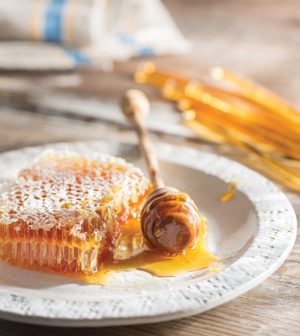
With all of the warm weather that the summer season brings, many of us are out and about soaking it up while enjoying all of the outdoor activities we miss in the colder winter months. Whether you’re an avid hiker, trail runner, kayaker, or climber, honey is the sweet sidekick that you can easily toss into your bag to fuel your next adventure! This week we’re sharing fun facts about honey’s all-natural energy and some of our best honey hacks that are sure to keep you running on full.
Honey...Natural Energy
Honey is a source of carbohydrates, providing 17 grams per tablespoon, which makes it ideal for your working muscles since carbohydrates are the primary fuel the body uses for energy. Carbohydrates are necessary in the diet to help maintain muscle glycogen, also known as stored carbohydrates, which are the most important fuel source for athletes to help them keep going.
Whether you’re looking for an energy boost or just a sweet reward after a long workout, honey is a quick, easy, and delicious all-natural energy source!
Honey as an Athletic Aid
Pre-exercise: For years, sports nutritionists have recommended eating carbohydrates before an athletic activity for an added energy boost. As with many carbohydrates, pure honey may be an effective form to ingest just prior to exercise. When honey is eaten before a workout or athletic activity, it is released into the system at a steady rate throughout the event.
During Exercise: Consuming carbohydrates, such as honey, during a workout helps your muscles stay nourished longer and delays fatigue, versus not using any aid or supplement. Next time you reach for a simple bottle of water, add some honey to it – it might give you that much-needed athletic boost!
Post-exercise: An optimal recovery plan is essential for any athlete. Research shows that ingesting a combination of carbohydrates and protein immediately following exercise (within 30 minutes) is ideal to refuel and decrease delayed-onset muscle soreness. Therefore, honey is a great source of carbohydrate to combine with post-workout protein supplements. In addition to promoting muscle recuperation and glycogen restoration, carb-protein combinations sustain favorable blood sugar concentrations after training.
Usage Tips
When planning your athletic training program, remember that honey is a source of carbohydrates, providing 17 grams at just 64 calories per tablespoon. Combining honey with fruits, vegetables, lean meats, whole grains and other healthful foods can add to your total nutrition and give you a great natural energy boost. Try these tips to fuel your diet with the sweet goodness of honey!
- Staying hydrated is one of the most important tools for an athlete. Simply add honey to your bottle of water for an energy boost during your next workout.
- Snacks are a great way to add extra fruits and vegetables to your diet. Try mixing peanut butter and honey, or honey and light cream cheese, as a dip for fresh fruits or vegetables.
- Peanut butter and honey sandwiches on whole wheat bread are a great, high-energy snack to provide a good combination of carbohydrates, protein and fat.
- Since honey is a convenient, portable source of energy, take it with you for tournaments and long periods of activity to help sustain your energy levels.
So whether you’re out catching some rays while doing your favorite activity, or just find yourself looking for a little mid-day boost while crushing it at the office, let honey fuel your day.
